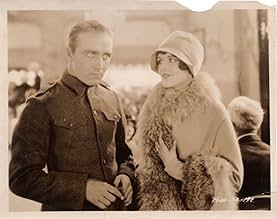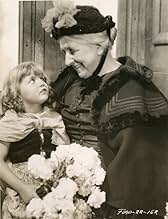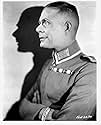VALUTAZIONE IMDb
7,2/10
989
LA TUA VALUTAZIONE
Aggiungi una trama nella tua linguaA family saga in which three sons of a Bavarian widow go to war for Germany and the fourth goes to America, Germany's eventual opponent.A family saga in which three sons of a Bavarian widow go to war for Germany and the fourth goes to America, Germany's eventual opponent.A family saga in which three sons of a Bavarian widow go to war for Germany and the fourth goes to America, Germany's eventual opponent.
- Regia
- Sceneggiatura
- Star
- Premi
- 3 vittorie totali
Frank Baker
- Soldier
- (non citato nei titoli originali)
George Blagoi
- Officer
- (non citato nei titoli originali)
Stanley Blystone
- Officer
- (non citato nei titoli originali)
Carl Boheme
- Officer
- (non citato nei titoli originali)
Constant Franke
- Officer
- (non citato nei titoli originali)
Recensioni in evidenza
In Germany, at the dawn of World War I, widow Margaret Mann (as Frau Bernle) is blessed with "Four Sons" - strapping soldier Francis X. Bushman Jr. (as Franz), dreamy rustic James Hall (as Joseph), handsome metalworker Charles Morton (as Johann), and fair-haired shepherd George Meeker (as Andreas). And, she makes the best honey-cakes in Bavaria. With one son serving the Fatherland, and two more about to join him on the battlefield, Ms. Mann arranges for adventurous Mr. Hall to emigrate to democratic America. There, he opens a delicatessen and marries sweet, beautiful June Collyer (as Annabelle). Eventually, the Great War results in multiple brother tragedies, testing old mother Mann's ability to count her blessings.
The last years of the "silent film" era produced an avalanche of stunning motion pictures; in hindsight, you wonder if the "talkie" might have prevented the silent from advancing even beyond its late 1920s peak. "Four Sons" is another artful example, with John Ford and his picturesque cameramen, George Schneiderman and Charles C. Clarke, directing under the influence of F.W. Murnau - the combination produced a winning film, full of memorable scenes and images. Ford's best symbolic double whammy has two white birds flying to heaven, followed by postman Albert Gran hurling stoning the church's reflection. The restored print looks lovely, but lacks the original's innovative "synchronized sound effects" track, which will hopefully turn up somewhere.
The film won the "Best Picture" of 1928 medal from "Photoplay" and placed #4 on the annual "Film Daily" honor roll.
********* Four Sons (2/13/28) John Ford ~ Margaret Mann, James Hall, George Meeker, Charles Morton
The last years of the "silent film" era produced an avalanche of stunning motion pictures; in hindsight, you wonder if the "talkie" might have prevented the silent from advancing even beyond its late 1920s peak. "Four Sons" is another artful example, with John Ford and his picturesque cameramen, George Schneiderman and Charles C. Clarke, directing under the influence of F.W. Murnau - the combination produced a winning film, full of memorable scenes and images. Ford's best symbolic double whammy has two white birds flying to heaven, followed by postman Albert Gran hurling stoning the church's reflection. The restored print looks lovely, but lacks the original's innovative "synchronized sound effects" track, which will hopefully turn up somewhere.
The film won the "Best Picture" of 1928 medal from "Photoplay" and placed #4 on the annual "Film Daily" honor roll.
********* Four Sons (2/13/28) John Ford ~ Margaret Mann, James Hall, George Meeker, Charles Morton
10finki
This classic John Ford masterpiece has been spoiled by bureaucratic incompentece.
Somebody in 20th Century-Fox has decided to remove the original Movietone soundtrack and replace it with an inappropriate score. it seems that for certain people, the original intentions of director John Ford were no good enough for today. Hence, the film was stripped of its sound... which means that we do not have the film as it was originally intended to be seen.
Even though in most parts of the world, as well here in the United States, most people saw the film in a silent version, the original soundtrack is a crucial element of the film and without it, the experience is incomplete.
A great film, but avoid the DVD until an authentic restored version with the original soundtrack becomes available.
Somebody in 20th Century-Fox has decided to remove the original Movietone soundtrack and replace it with an inappropriate score. it seems that for certain people, the original intentions of director John Ford were no good enough for today. Hence, the film was stripped of its sound... which means that we do not have the film as it was originally intended to be seen.
Even though in most parts of the world, as well here in the United States, most people saw the film in a silent version, the original soundtrack is a crucial element of the film and without it, the experience is incomplete.
A great film, but avoid the DVD until an authentic restored version with the original soundtrack becomes available.
By chance I wound up watching this wonderfully beautifully crafted film on all counts this evening on Turner. The film work is masterfully done with John Ford's usual care and sensitivity to his audience. Mary Mann is outstanding as the mother of her ever faithful sons who go to war. Many will remember her right away as the sweet Grandma in The Little Rascals "Go fly a Kite" and proves what a powerful performer she was and it's a pity she was not given more opportunities.
James Hall who plays Joseph who goes to America to seek his fortune is a real find and I would like to know more about him. Handsome and quite charming and it's puzzling why he was not utilized in his career as well. A silent film that would be a nice introduction to anyone who has been hesitant about watching this lost art form. Worth the time and love to own this if it ever comes out in DVD.
James Hall who plays Joseph who goes to America to seek his fortune is a real find and I would like to know more about him. Handsome and quite charming and it's puzzling why he was not utilized in his career as well. A silent film that would be a nice introduction to anyone who has been hesitant about watching this lost art form. Worth the time and love to own this if it ever comes out in DVD.
In late 1920s Hollywood there was a brief craze for German cinema, especially at Fox, who had recently appropriated FW Murnau. It was no surprise then that, as well as bringing over the genuine article, the studios would also begin cranking out a few pictures that were Germanic in setting if not in style. Four Sons also takes advantage of the trend for World War pictures after the success The Big Parade.
As well as directing Four Sons, John Ford was also the producer, which is bit of a mixed blessing. With the director allowed greater executive control you get all the best and worst of the free-range Ford. As has often been remarked, Ford had "economy of expression" that is, the ability to convey information and story in as few shots as possible. The flipside of this however is that he did tend to get bogged down with comedy scenes, or in this case restating and reinforcing the sense of rural simplicity and family unity until it becomes more monotonous than moving. The comic moments are particularly weak in this picture just fat men with moustaches and Prussians with monocles being stereotypically Teutonic.
But one great advantage of having Ford as producer is that the picture is relatively free from unnecessary intertitles. All the great silent directors were of course skilled visual storytellers and Ford is no exception, and of course different screenwriters vary in their wordiness, but the frequency and necessity of intertitles would ultimately be down to whoever was in overall charge of the production. Ford has here cut down the title cards to a minimum, and so we get some great little moments such as the postman turning the first letter over in Mother Bernle's hands to let us know that she cannot read, or the villagers approaching the postman to find out if is their family who is to receive the black envelope moments which would have been ruined by a load of intertitles in many other productions of this era.
And the visual style of Ford's pictures was by now more or less fully developed. It's interesting to see here how in Ford's world there is no midpoint between town and country. We don't see, for example, the village framed by surrounding hills or fields, or even against the sky. The village itself is the frame and the background, as if to make it an enclosed and totally civilized space. In contrast, whenever Ford shot a scene out in the wilderness he emphasised its openness although Four Sons never really gets out in the open air so you don't see that here.
While Four Sons may be somewhat awash with sentimentality, Ford's simplistic approach of showing the tenderest moments with delicate shot composition does at least allow the picture some dignity. For example, he uses the overhead light to throw an almost heavenly glow over the family meal scene, then later echoes this with the shot of Mother Bernle grieving in a shaft of daylight. The most effective shot of all though is when Joseph says goodbye to his wife before going off to war. Ford goes against convention by filming the couple from behind in long shot, and the beauty of this moment almost makes me forgive all the other flaws of the picture. It's also a good decision not to show their faces, because James Hall was not a particularly good actor, as we can see in the scene where he returns home again.
In spite these touches of brilliance, the picture as a whole is weakened because it continually bombards us with either sentiment or tragedy. Of course, cinema would be dull indeed without poignancy, but poignancy only works in small doses. Saturate a picture in emotions and the individual tugs lose impact. Four Sons is a good work for Ford the director, but this fact doesn't quite save it from the poor judgment of Ford the producer.
As well as directing Four Sons, John Ford was also the producer, which is bit of a mixed blessing. With the director allowed greater executive control you get all the best and worst of the free-range Ford. As has often been remarked, Ford had "economy of expression" that is, the ability to convey information and story in as few shots as possible. The flipside of this however is that he did tend to get bogged down with comedy scenes, or in this case restating and reinforcing the sense of rural simplicity and family unity until it becomes more monotonous than moving. The comic moments are particularly weak in this picture just fat men with moustaches and Prussians with monocles being stereotypically Teutonic.
But one great advantage of having Ford as producer is that the picture is relatively free from unnecessary intertitles. All the great silent directors were of course skilled visual storytellers and Ford is no exception, and of course different screenwriters vary in their wordiness, but the frequency and necessity of intertitles would ultimately be down to whoever was in overall charge of the production. Ford has here cut down the title cards to a minimum, and so we get some great little moments such as the postman turning the first letter over in Mother Bernle's hands to let us know that she cannot read, or the villagers approaching the postman to find out if is their family who is to receive the black envelope moments which would have been ruined by a load of intertitles in many other productions of this era.
And the visual style of Ford's pictures was by now more or less fully developed. It's interesting to see here how in Ford's world there is no midpoint between town and country. We don't see, for example, the village framed by surrounding hills or fields, or even against the sky. The village itself is the frame and the background, as if to make it an enclosed and totally civilized space. In contrast, whenever Ford shot a scene out in the wilderness he emphasised its openness although Four Sons never really gets out in the open air so you don't see that here.
While Four Sons may be somewhat awash with sentimentality, Ford's simplistic approach of showing the tenderest moments with delicate shot composition does at least allow the picture some dignity. For example, he uses the overhead light to throw an almost heavenly glow over the family meal scene, then later echoes this with the shot of Mother Bernle grieving in a shaft of daylight. The most effective shot of all though is when Joseph says goodbye to his wife before going off to war. Ford goes against convention by filming the couple from behind in long shot, and the beauty of this moment almost makes me forgive all the other flaws of the picture. It's also a good decision not to show their faces, because James Hall was not a particularly good actor, as we can see in the scene where he returns home again.
In spite these touches of brilliance, the picture as a whole is weakened because it continually bombards us with either sentiment or tragedy. Of course, cinema would be dull indeed without poignancy, but poignancy only works in small doses. Saturate a picture in emotions and the individual tugs lose impact. Four Sons is a good work for Ford the director, but this fact doesn't quite save it from the poor judgment of Ford the producer.
John Ford is truly great filmmaker this is the pinnacle (well in my opinion) of silent film. Margaret Mann is a revelation her performance is so enthralling especially in some of the final scenes at the end of the picture.
The story is a strong one but the direction and the way it is put together is truly sensational Ford himself is Irish and this film i feel may be close to his roots.
I was amazed the film didn't have many title cards however it was so simple to follow and by the end of it you're moved by mann's performance. you feel and care for the characters the whole way through that's the mark of a great film.
And for the film buffs watch the early scenes in the film you got to love the tracking shot the mark of master John Ford
The story is a strong one but the direction and the way it is put together is truly sensational Ford himself is Irish and this film i feel may be close to his roots.
I was amazed the film didn't have many title cards however it was so simple to follow and by the end of it you're moved by mann's performance. you feel and care for the characters the whole way through that's the mark of a great film.
And for the film buffs watch the early scenes in the film you got to love the tracking shot the mark of master John Ford
Lo sapevi?
- QuizThe film set a permanent attendance record at New York's Roxy Theater
- BlooperIn the New York City sequences, which take place immediately after World War I (1919-1920), all of the women's fashions are strictly in the style of 1928, and all of the automobiles are of late-1920s design.
- Citazioni
The Schoolmaster: Books, Herr Postman, are friends that never deceive,
- ConnessioniFeatured in Hollywood (1980)
- Colonne sonoreLittle Mother
(1928) (uncredited)
Music by Erno Rapee
Lyrics by Lew Pollack
Sung by Harold Van Duzee and the Roxy Male Quartette
I più visti
Accedi per valutare e creare un elenco di titoli salvati per ottenere consigli personalizzati
Dettagli
- Data di uscita
- Paese di origine
- Lingua
- Celebre anche come
- Four Sons
- Luoghi delle riprese
- Azienda produttrice
- Vedi altri crediti dell’azienda su IMDbPro
- Tempo di esecuzione1 ora 40 minuti
Contribuisci a questa pagina
Suggerisci una modifica o aggiungi i contenuti mancanti




































